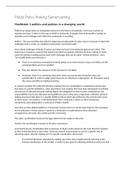Summary
Summary Complete summery Public Policy Making
- Course
- Institution
- Book
Would you also like to get a 9 for your Public Policy Making exam? Then you are in the right place! This summary is peer-reviewed and helps you to get a nice grade! It is written in understandable English and the Dutch translation is given where necessary. The complete book Public Policy in Action,...
[Show more]




